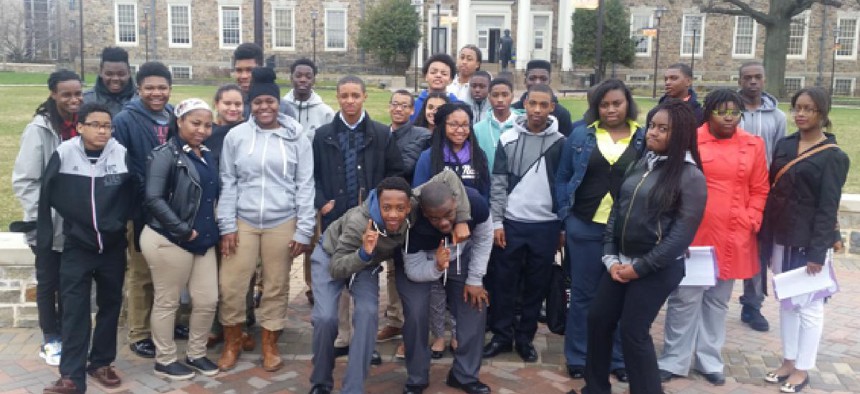Supportive Children’s Advocacy Network: Empowering parents to promote education

A high school diploma is still out of reach for 50 percent of East Harlem students and many of their peers in the South Bronx – the nation’s poorest catchment area where students consistently rank at the bottom in standardized tests. While city officials have developed a neighborhood action plan to address this thorny issue and others East Harlem faces, Supportive Children’s Advocacy Network (SCAN), a nonprofit with a budget of $14.3 million that operates 23 program sites in the area, has developed a model that empowers not only young people but also their parents by engaging them to recruit participants, providing training and jobs and using them to help keep kids in school.
“Low test results in District 9 are not the teachers’ fault – they’re due to inadequate resources in the schools, a lack of computers, books and standard equipment, intersecting with systemic forces of poverty and segregation, which results in children learning less well,” said SCAN Executive Director Lewis Zuchman, who also serves as chairman of the Human Services Consortium of East Harlem and teaches at the Colin Powell School for Civic and Global Leadership at City College.
After nearly 30 years as a nonprofit leader in the East Harlem community, Zuchman has witnessed a deterioration in the quality of life among individuals in the area. “The confluence of concentrated poverty, segregation, a punitive criminal justice system and related systemic forces, have created an ever more imposing set of environmental obstacles for our young people," noted Zuchman.
However, Zuchman has seized an opportunity to improve the education system by making a difference where students live: in their homes and communities. Rather than hire from the outside, Zuchman taps into the local talent pool “wherever possible.” With 350 part-time and 110 full-time positions, SCAN is a major employer among the 1,000 families and 7,000 children that use its services on an annual basis.
“When I first told parents we needed their help, about 40 percent signed up for training right away,” he said. “Partnering with parents is a win-win for the community and for SCAN.”
In 2015, SCAN partnered with the New York Junior League to launch a new initiative called “Reading Rangers.” Volunteers work one-on-one to share the love of reading with children and meet with parents monthly.
“We often talk of empowerment in word,” Zuchman stated, “however, preaching to parents and teens about how bright they are, or what they can accomplish, are just words. To employ said parent and teens, to give them responsibility, to promote parents to positions of program director, turns cheerleading into concrete action – action that demonstrates our faith in their capacity to do for themselves. This is true empowerment.”
At the middle and high school levels, Zuchman is proud of “Reach for the Stars,” a successful program that partners with public and charter schools to provide 80 students a year with counseling, help with financial aid applications and other interventions. Any SCAN-affiliated young person – even one with a C average – is eligible to apply. Each year about 90 percent of former Reach for the Stars participants matriculate at top academic institutions, including the Ivy League. Current SCAN board member Jamel Oeser-Sweat, now an attorney, is an early graduate of the program.
“I remember Jamel as a bright kid who went on to win a Westinghouse Science Award and now he’s my boss,” said Zuchman with a smile. “The college completion rate of the students in our program exceeds that of the national average.”

(Billy Green leads a GLASS-sponsored "Over the Rainbow" panel discussing issues of LGBTQ inclusion.)
A SCAN program breaking new ground within the teen population is Gay Lesbian And Straight Supporters (GLASS), which is the only community-based program in Upper Manhattan serving the full spectrum of LGBTQ youth of color from its headquarters at a NYCHA development. Zuchman was inspired to start the program after attending the 50th reunion of the original Freedom Riders, of which he was a member. He was further inspired by a teenager who asked for a room to practice the dance style called voguing. “This young man had been thrown out of the home by his mother, although she kept his twin brother – a gang leader – with her,” Zuchman said.
It was the second time Zuchman attempted to create a program for inner-city LGBTQ teens. His first effort, about 10 years earlier, “fell apart due both to the lack of sensitivity training as well as the fact that coming out in East Harlem is still a tough choice,” he said. In addition, Zuchman observed that the surrounding LGBTQ community was “siloed,” and considerable conflicts existed between different LGBTQ constituent groups. “I’m lucky to have a responsive, strong board that supported this effort,” Zuchman said, “and we were fortunate to win a $20,000 startup grant.”
In addition, Zuchman recruited the leadership of respected East Harlem activist Billy Green, a chemistry teacher at Frederick Douglass Academy, who has become the backbone of GLASS. Green, a semi-finalist for the 2014 Gay, Lesbian and Straight Education Network Educator of the Year Award, offers an open forum for dialogue and a safe haven for LGBTQ teens.
On May 7, GLASS hosted “Unsung Heroes” at the Silberman School of Social Work, a daylong seminar to honor Bayard Rustin, a closeted activist who mentored Martin Luther King and organized the March on Washington in 1963. At the final breakout session, 24 people including Zuchman and Rustin’s life partner, Walter Naegele, shared personal experiences and reflections. “We weren’t born in a closet,” Green said, “and we all have to learn how to deal with the world.”
The program is an example of SCAN’s mission to keep its community centers open to all and to address community needs as they arise. “The most important aspect of my duties as E.D. is to remain engaged with the community,” Zuchman said.
